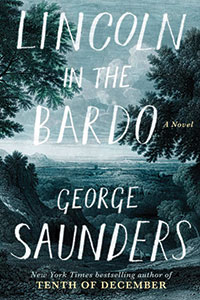
Book Club
George Saunders
Monday, September 17, 2018
7 – 8:30 p.m.
Synopsis
*Winner, 2017 Man Booker Prize
A moving and original father-son story featuring none other than Abraham Lincoln, as well as an unforgettable cast of supporting characters, living and dead, historical and invented.
February 1862. The Civil War is less than one year old. The fighting has begun in earnest, and the nation has begun to realize it is in for a long, bloody struggle.
Meanwhile, President Lincoln’s beloved eleven-year-old son, Willie, lies upstairs in the White House, gravely ill. In a matter of days, despite predictions of a recovery, Willie dies and is laid to rest in a Georgetown cemetery.
“My poor boy, he was too good for this earth,” the president says at the time. “God has called him home.” Newspapers report that a grief-stricken Lincoln returns, alone, to the crypt several times to hold his boy’s body.
From that seed of historical truth, George Saunders spins an unforgettable story of familial love and loss that breaks free of its realistic, historical framework into a supernatural realm both hilarious and terrifying. Willie Lincoln finds himself in a strange purgatory where ghosts mingle, gripe, commiserate, quarrel, and enact bizarre acts of penance. Within this transitional state—called, in the Tibetan tradition, the bardo—a monumental struggle erupts over young Willie’s soul.
Lincoln in the Bardo is an astonishing feat of imagination and a bold step forward from one of the most important and influential writers of his generation. Formally daring, generous in spirit, deeply concerned with matters of the heart, it is a testament to fiction’s ability to speak honestly and powerfully to the things that really matter to us.
Saunders has invented a thrilling new form that deploys a kaleidoscopic, theatrical panorama of voices to ask a timeless, profound question: How do we live and love when we know that everything we love must end?
(From the publisher)
Reading Group Discussion Questions
1. The presence of a child in the bardo is rare, but what other things about Willie make him different from the other ghosts?
2. Which of the ghosts’ stories resonated with you the most?
3. How did the style and form of the book enhance or detract from your experience of the story? What did you think of the author’s decision to include snippets of real, historical sources among the fictional narration?
4. In what ways do the social structures of this time period manifest in the bardo? How does Saunders play with and explore historical attitudes towards race and class throughout the novel?
5. In what ways does Saunders challenge and expand the genre of historical fiction? Why do you think Lincoln and his legacy remain such popular subjects in literature today?
6. It is unknown, both to the reader and to the character of the Reverend Everly Thomas, why he is damned, even though he understands that he is dead. What do you think is meant by this omission?
7. On page 87, the Reverend Everly Thomas explains the Barons’ existence on either side of the dreaded fence as not about wealth per se, but about being “wealthy in spirit.” Discuss what this means, and how it relates to the slaves’ ability to be near the fence while the other ghosts remain unable to stand such proximity.
8. Roger Bevins says that “all were in sorrow, or had been, or soon would be.” Vollman responds by saying “It was the nature of things” and that we are all “suffering, limited beings.” Do you agree?
9. George Saunders has described the question at the core of this book as, “How do we continue to love in a world in which the objects of our love are so conditional?” Did you find this to be true, and do you feel like you came to a deeper understanding of mortality?
10. Towards the end, the ghosts unite in an attempt to “enter” Lincoln’s mind and stop him from leaving the graveyard. In doing so, they find themselves transformed from their wretched states, remembering parts of their lives that had been lost to them since entering the bardo. Discuss the significance of this transformation.
11. Discuss the final scene, in which Thomas Havens follows Lincoln out of the graveyard on horseback. What do you think this foreshadows?
(Questions issued by publisher.)
Additional Book Club Resources
Other Works by George Saunders
Novels
• Lincoln in the Bardo (2017)
Short Fiction Collections
• CivilWarLand in Bad Decline (1996)
• Pastoralia (2000)
• In Persuasion Nation (2006)
• Tenth of December: Stories (2013)
Short Stories/Novellas (Not anthologized)
• “I can speak!” (1999), The New Yorker
• The Very Persistent Gappers of Frip (2000)
• The Brief and Frightening Reign of Phil (2005)
• Fox (2013), E-book only
• “A Two-Minute Note to the Future” (2014)
• “Mother’s Day” (2016), The New Yorker
Essays & Reporting
• A bee stung me, so I killed all the fish (notes from the Homeland 2003–2006) (2006)
• The Braindead Megaphone (2007) (collected essays)
• Congratulations, by the way: Some Thoughts on Kindness (2014)
Anthologies
• Fakes: An Anthology of Pseudo-Interviews, Faux-Lectures, Quasi-Letters, “Found” Texts, and Other Fraudulent Artifacts, edited by David Shields and Matthew Vollmer (2012)
If You Liked Lincoln in the Bardo, May We Recommend …
Five-Carat Soul, James McBride
The Angel of History, Rabih Alameddine
Ninety-Nine Stories of God, Joy Williams
Mr. Lincoln’s Wars: A Novel in Thirteen Stories, Adam Braver
The Underground Railroad, Colson Whitehead
The Impeachment of Abraham Lincoln, Stephen L. Carter
The Divine Comedy, Dante Alighieri
Spoon River Anthology, Edgar Lee Masters
Lincoln’s Melancholy: How Depression Challenged A President and Fueled His Greatness, Joshua Wolf Shenk
Mrs. Lincoln: A Life, Catherine Clinton

